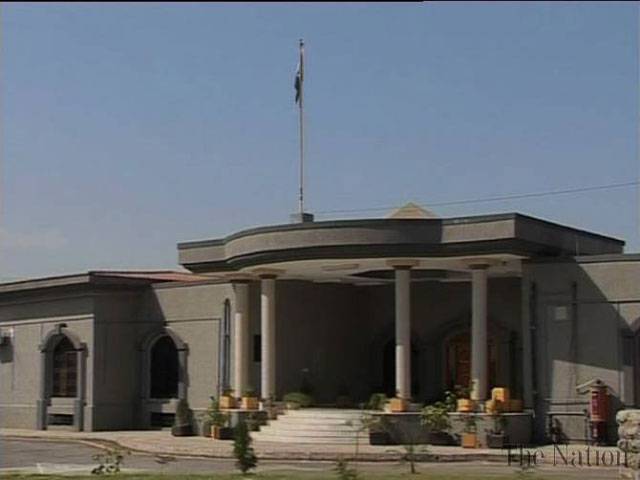ISLAMABAD - A petition challenging the Protection of Pakistan Ordinance (PPO) 2013 was moved in the Islamabad High Court (IHC) here on Thursday.
However, a single bench of IHC comprising Justice Riaz Ahmad referred the petition to Chief Justice (CJ) IHC Muhammad Anwar Khan Kasi for further proceedings in this regard.
Advocate Saleem Ullah Khan filed the petition under Article 199 of the Constitution of Pakistan against the recently promulgated Protection of Pakistan Ordinance and prayed the court that the said Ordinance may be struck down.
In the petition, Saleem maintained that recently promulgated ordinance violated the Constitution of Pakistan.
He contended that Section-17 of the PPO took away the important powers of the High Court, which cannot be done in the manner that has been adopted to do the same.
“According to Section-14 of the said Ordinance, the accused under this ordinance has been burdened with the burden of proof of his innocence in violation of the settled principles of criminal law i.e., an accused shall be presumed to be innocent unless he is proved guilty beyond reasonable doubt and that the accused is favourite child of law,” he added.
He further argued that on existence of reasonable evidence, the accused shall be presumed to be engaged in waging war or insurrection against Pakistan unless he establishes his non-involvement in the offence.
Khan added that Section-8(5) of the ordinance reveals that a surreptitious and devious back door of entry to the judiciary has been opened to accommodate DMG officers, officers of Pakistan Administrative Service and the Provincial Administrative Services of BS-18 and above as judicial officers in violation of the “separation of the judiciary from the executive”.
The petitioner stated that the impugned ordinance, inter alia, takes away the powers of the high court of confirmation of death penalty awarded by the sessions court, the power of to call for the record of the inferior courts, power of revision and appeal, the power to suspend sentence, pending appeal, power of High Court to issue direction in the nature of habeas corpus, power to grant bail, and above all, the inherent powers of the High Court under Section 561-A CrPC.
“Section-9 takes away the power of Supreme Court of Pakistan under Article 186-A of the Constitution to transfer cases between provinces,” he maintained.
Advocate Saleem was of the view that the sanctification of infamous “safe houses” under Section -12 of the Ordinance is likely to heighten the misuse of such safe houses and the proliferation of the menace of “missing persons”.
He maintained that Section - 3 (2)(a) of the Ordinance amounts to giving a “license to kill” on sheer suspicion, to the Armed Forces and the Civil Armed Forces.
Khan said that Section 5(5) of the Ordinance provides that a detainee under this ordinance whose identity is unascertainable shall be considered an “enemy alien” who shall be presumed to have joined waging war or insurrection against Pakistan. The ridiculousness and draconian nature of this provision is appeared and floating on its surface.
“As per Section -7, the report of the Joint Investigation Team shall be admissible against the accused, which goes against the Qanun-e-Shahadat, 1984 and without necessary amendment in the same, this provision could not be made a part of the ordinance,” maintained the petitioner.
He said that the appeal from the judgment of the Special Court set up under this ordinance shall lie directly to the Supreme Court of Pakistan, completely bypassing the high court.
Khan adopted in his petition that the ordinance is a poorly worded document, full of confusion, injurious to the existing system of law and justice in Pakistan and an impracticable piece of legislation, liable to be struck down in the interest of justice.
He added that the said ordinance is an open interference in and curtailment of the jurisdiction of superior courts of Pakistan.
Therefore, he prayed that his petition may be accepted and the Ordinance may be struck down in the interest of justice.
Thursday, April 18, 2024
islamabad high court MOVED AGAISNT PPO

Taylor Swift fans lose £1m in scams
April 18, 2024
Qawwal Aziz Mian remembered on 82nd birth anniversary
April 18, 2024
Climate change will make you poorer, says a new report
April 18, 2024
Political Reconciliation
April 16, 2024
Pricing Pressures
April 16, 2024
Western Hypocrisy
April 16, 2024
Policing Reforms
April 15, 2024
Storm Safety
April 15, 2024
Workforce inequality
April 17, 2024
New partnerships
April 17, 2024
Shikarpur crisis
April 17, 2024
Peace quest
April 17, 2024
Democratic harmony
April 16, 2024
ePaper - Nawaiwaqt
Advertisement
Nawaiwaqt Group | Copyright © 2024





